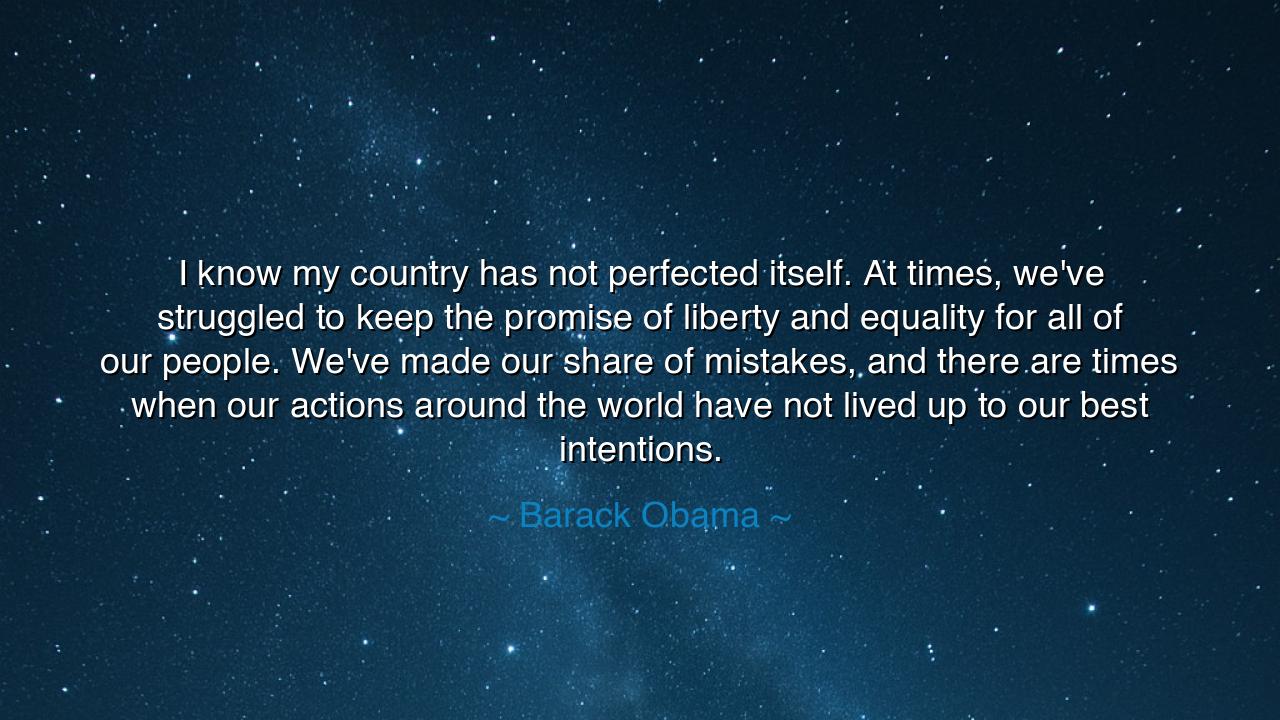
I know my country has not perfected itself. At times, we've
I know my country has not perfected itself. At times, we've struggled to keep the promise of liberty and equality for all of our people. We've made our share of mistakes, and there are times when our actions around the world have not lived up to our best intentions.






The words of Barack Obama—“I know my country has not perfected itself. At times, we’ve struggled to keep the promise of liberty and equality for all of our people. We’ve made our share of mistakes, and there are times when our actions around the world have not lived up to our best intentions.”—resound with humility, honesty, and hope. In them, one hears not the boast of a nation drunk on power, but the measured voice of a leader who loves his homeland deeply enough to speak truth about its imperfections. Obama’s words, spoken in an age when America stood at a crossroads of identity, carry the ancient wisdom that true greatness is born not from denial, but from the courage to confront one’s flaws. He spoke not only of a country but of the human soul itself—for nations, like people, are always unfinished works, striving toward their ideals through struggle and repentance.
The origin of this quote lies in Obama’s long belief that patriotism and criticism are not enemies but companions. He uttered these words during his presidency as part of his broader message to the world: that America’s strength comes not from pretending to be perfect, but from its willingness to grow. This sentiment echoed the very spirit of the republic’s founding, for when the Declaration of Independence proclaimed that all men are created equal, it did so in hope, not in completion. The founders set forth a promise that future generations would have to fulfill—a promise repeatedly tested by slavery, war, inequality, and injustice. Obama’s acknowledgment of these failings was not an act of shame, but of moral courage, reminding the world that love of country is hollow if it cannot withstand the weight of truth.
Throughout history, the greatest nations and civilizations have walked this same path of contradiction. The Roman Republic preached liberty yet enslaved millions; the British Empire spread civilization even as it bound nations in chains. America, too, has borne this duality—championing freedom abroad while struggling to preserve it at home. Obama’s words thus stand as an echo of history’s lesson: that power without humility breeds arrogance, and that the only nations that endure are those that can face their sins without surrendering their ideals. In this humility lies renewal; in this confession lies the strength to begin again.
Consider the story of Abraham Lincoln, who, in the midst of civil war, confessed that both North and South had offended justice and that “the Almighty has His own purposes.” Lincoln, like Obama generations later, understood that a nation’s moral authority depends not on its perfection, but on its willingness to seek redemption. When America abolished slavery, it did not erase its guilt, but it took a step closer to its promise. When it marched for civil rights, it did not become flawless, but it grew more honest. Thus, progress is not a destination, but a pilgrimage—a continual returning to the ideals that first gave birth to the dream of liberty.
Obama’s words also carry a message for the citizen as much as for the nation. For a country is not an abstraction—it is a mirror of its people. To admit that one’s nation has erred is to admit that we, too, have fallen short. Each generation must renew the work of justice; each person must guard against the complacency that breeds hypocrisy. To love one’s country is to demand that it live up to its best self, even when it fails. Patriotism without accountability becomes idolatry, but patriotism with conscience becomes strength. The wise do not curse their homeland for its imperfections—they labor to perfect it.
The deeper meaning of Obama’s words is that intention alone is not enough. A nation, like an individual, is often judged not by its dreams but by its deeds. It is easy to proclaim freedom and equality; it is harder to ensure them. Yet even in acknowledging America’s failings, Obama points to the light that guides her still—the eternal striving toward justice, the belief that mistakes are not the end of the story, but the beginning of wisdom. This is the greatness of democracy: not in its perfection, but in its endless capacity for renewal.
So let this teaching pass down to future generations: do not love your country blindly, but love it bravely. When it falters, lift it; when it errs, correct it; when it forgets its promise, remind it. For just as a person grows through reflection and repentance, so too must a nation evolve through humility and truth. Seek always to build a society where liberty and equality are not merely words carved in stone, but living realities embodied in every act of governance, every gesture of kindness, every voice raised in defense of justice.
And thus, remember these words of Obama—not as the confession of weakness, but as the declaration of strength. A nation that dares to face its flaws is one that refuses to decay. A people who acknowledge their failures are those most capable of greatness. For only through truth does a country renew its soul, and only through humility does liberty endure.






AAdministratorAdministrator
Welcome, honored guests. Please leave a comment, we will respond soon